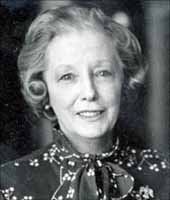 OBITUARY - The Independent
OBITUARY - The Independent
by Michael Ward
M. M. Kaye, who died aged 95 on 29th January, earned international acclaim as the author of The Far Pavilions, a best-selling historical romance set in India at the height of the British Raj. It was a work of such epic proportions and literary worth that one American critic was moved to say "Were Miss Kaye to produce no other book, The Far Pavilions might stand as a lasting accomplishment in a single work comparable to Margaret Mitchell’s achievements in Gone with the Wind”. More important to Mollie Kaye was the reaction of the public and particularly the Indian public whose approval she was keenest to win. To her great joy, they perceived her as a writer who "saw with an Indian eye" and "wrote with an Indian heart". The novel has sold over 15 million copies in 16 languages.
Mollie was born in Simla, in 1908, the daughter of Sir Cecil Kaye, a civil servant fluent in nine languages, and Daisy, an accomplished artist. Her childhood and early adulthood is captured in a three part autobiography The Sun In The Morning, Golden Afternoon and Enchanted Evening in which she evokes the sights, smells and sounds of the India she knew and loved.
Being packed off to boarding school in England at the age of 10 filled Mollie and her sister, Bets, with dread; their only way of responding to the inevitable bullies was to insult them in Hindi! Like their mother, Mollie and Bets were to become accomplished artists and, on leaving school, Mollie made a modest living as an illustrator of children's books. After reading a thriller which she found unimpressive, she decided to write one herself on the basis that "it couldn't be worse". Had it not been accepted, she “would never - hand on heart - never have tried another publisher.” The fee of £64 provided the encouragement to continue, as well as sufficient funds for her to travel back to India.
In 1942, she was to marry the love of her life, Goff Hamilton (Later Major-General) an officer in the QVO Corp of Guides who had won the DSO aged 23, fighting on India's North West Frontier. A romantic through and through, she would admit "All my heroes were Goff". Discovering that a seventy strong contingent of Guides had been wiped out defending the British Residency in Kabul, inspired her to situate The Far Pavilions in that context, particularly as one of her husband's ancestors, Walter Hamilton VC, had died there with his men.
Other published works include a number of children's books including The Ordinary Princess (televised on the BBC’s Jackanory) and Thistledown - as well as a series of atmospheric murder mysteries under the collective “Death In..." title, leading one US critic to suggest that “M M Kaye outdoes Agatha Christie in palming the ace”. The exotic locations to which the army posted her husband (the couple moved house 22 times in 17 years) account for these novels being set in Kashmir, Cyprus, Kenya, Zanzibar, the Andaman Islands, and Germany.
In 1957 she wrote Shadow of the Moon about the Indian Mutiny, and Trade Wind in 1963 about the last outpost of the Slave Trade. She began writing The Far Pavilions in 1963 completing it in 1978 having had to battle with lymphosarcoma - a rare form of lung cancer. Her editor and one of her greatest friends at Penguin Books was Paul Scott, author of the The Raj Quartet, for whom Mollie was to prove a mine of information on India. During one of their long telephone conversations, Scott remarked that Mollie should be buying diamonds rather than spending her income on telephone bills. In typical style, Mollie laughed and replied that she was doing just that by listening to the words of a great man.
The Far Pavilions was adapted as a mini-series for television in 1983, starring Ben Cross, Amy Irving and Omar Sharif. It was shown on Channel Four in the UK and broadcast in 30 countries. Mollie went with the crew on location to Rajasthan where she was to prove an invaluable ally, obtaining the loan of 50 elephants from the Maharajah of Jaipur.
She later gave permission for The Far Pavilions to be adapted as a stage musical, and became an avid supporter of the project thanking the creators for making her last years so exciting. "Who in their nineties has anything to look forward to?" she said, relishing the opportunity to be consulted on changes. A cast of actors including one of her favourite Indian actors, Victor Banerjee, had just begun a workshop in the week she died. She had urged the producer to "Hurry the production along!" but realised that the odds of her attending a West End opening were slim. For all her romanticism, she had a pragmatic side and had prepared a typically humorous statement: "I don't mind telling you that if I should fall off my worldly twig before the curtain is up, I shall make an awful nuisance of myself in the next life unless I am allowed back to see it run!"
In March 2003, her beloved India officially recognised her worth. M. M. Kaye was awarded the James Tod International Award by the Maharana Mewar Foundation in Udaipur, Rajasthan, "for her outstanding contribution to the spirit and values of Mewar". She was thrilled to receive the Award, donating the prize toward the construction of fresh water wells in the drought-stricken state. Her fond farewell to India found expression in a few lines from A. E. Houseman: "This is the land of lost content, I see her shining plain, these happy highways where I went, I cannot come again".
There is no doubt that at the end of an extraordinary life, M. M. Kaye had become more than a wonderful storyteller, being an inspiration to future generations, a builder of bridges and a force for good.
Michael E. Ward
